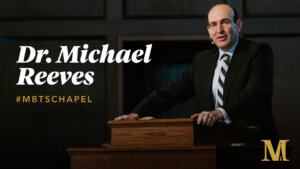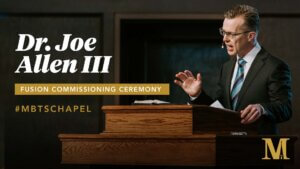Fall Convocation at Midwestern Seminary proceeded on Aug. 26 as it has since 1957—only with a twist.
In addition to the usual pomp and pageantry of the service, due to safety concerns over Covid-19, the great hymns normally belted out by attendees were somewhat muffled by protective masks, and faculty, students, and guests usually seated shoulder-to-shoulder now were socially distanced in the chapel and in overflow classrooms across campus. Many even took in the service via livestream.
The twists and uncertainty surrounding the pandemic, however, did not dampen the seminary community’s joy, as attendees reveled in worshipping Jesus together in chapel for the first time since March.
Midwestern Seminary President Jason Allen expressed the mood best, saying, “This feels and, indeed, is different from any other fall semester we’ve experienced in our history, but it is still good, sweet, and right that we are here at this time doing what we’re doing.”
Allen added that if one compared this Convocation service and start to the semester to previous years, he or she may find it to be lacking in some ways. However, when comparing the way the semester has started in light of what Covid has wrought over the past five months—“There is a joy, eagerness, and thankfulness to God that, in spite of all of that’s taken place, we can be here together learning, studying, and teaching for Christ’s church in this place today.”
Shifting his focus to the Convocation message, Allen explained that for Fall semester, chapel attendees will be taught by faculty and local pastors through a sermon series entitled, “The Gospel According to James.”
Allen initiated the series with a message from James 1:1-11 entitled, “You Can Trust Him.” In doing so, he noted that with all the disruptions, uncertainty, and complications caused by the pandemic over the past several months, it is important to continue to trust the Lord.
Of the recent and continuing uncertain times, Allen shared, “We need a word from the Lord. We need a word from Scripture. We need to be taught. We need to be informed how to live the Christian life and, in particular, how to engage in our own seasons of trial, of contest, perhaps of discouragement, perhaps even of despair.”
He added that in our cultural context, it’s difficult to know what or whom to trust. Unreservedly, Allen stated this isn’t the case with God, saying, “Brothers and sisters, I tell you this morning from the promise of these verses, you can trust Him.”
Breaking down the passage into three main points, Allen explained that we can trust God through our trials; we can trust God in our uncertainty; and we can trust God in our material circumstances.
In verses 1-4, James addressed a Jewish audience that was enduring persecution, and they were also dislocated and separated. James addressed their situation and how to live within it. Allen said the same is true of many believers today.
“There are many…of you that come into this chapel service today, and if you’re honest with yourself and honest with your neighbors, you are in the midst of a trial. You are disoriented by it; you are discouraged by it; and you may even be depressed by it.”
Allen offered an urgent response to those who are struggling, saying, “Consider it all joy. It’s worthwhile. It has come from God. Cultivate joy in your life when…you experience various trials.”
The reason one can trust God in his or her trials is because of an understanding of God’s character, of his superintending providence, of the length of his arm in which nothing is beyond reach, and of the genius of his plan upon which nothing can be improved.
Allen suggested, “That type of God is not only worthy of our trust, that type of God emboldens our joy through those trials.”
Secondly, Allen noted that we can trust God, even in our times of doubt. James provides a great promise from God, and that is: if one asks for wisdom, God graciously and authentically invites him or her to do so, and he will grant it. There’s absolutely no pretense.
Allen also explained that this passage isn’t saying believers won’t or can’t have doubts. Instead, verse six implores us not to doubt the character and goodness of God.
“The point is not that we cannot ask with a weak faith, the point is that we should not ask with a divided faith,” Allen said. “Our trust is in the Lord. Our faith is in the Lord, and it might be that at any given moment our faith is rather weak. In fact, it might even feel quite pathetic on our part. But it is solely given to Christ. It’s devoted to him. Our faith mustn’t be perfect, just singular; it mustn’t be fully developed, just not divided.”
Lastly, Allen urged the audience to “trust the Lord for where he has you circumstantially, materially, and follow him through it.”
He said many people think that if all is perfect in their world, then they would be better able to serve the Lord. Allen posited that wouldn’t necessarily be the case because if everything’s going right, then they are less likely to humble themselves before a holy God.
However, he said, “Often when life isn’t firing on all cylinders, believers might be more apt to feel the urgency, and even the exigencies, of life taking place, so often the Lord uses that to bring us to Jesus.”
To hear Allen’s complete Convocation message, visit: mbts.edu/fa20convocation


